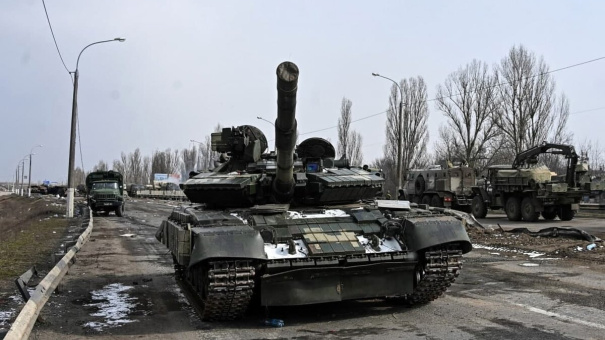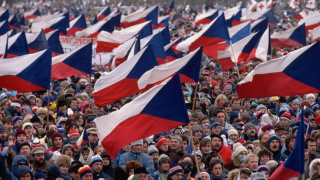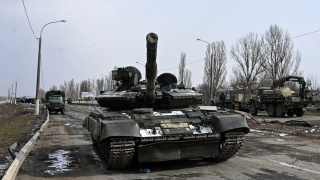Unprecedented Measures: The State's Response to The Ukrainian Crisis
Summary
Russia´s military operation in the Ukraine has become a real game-changer in terms of national security policies and their impacts on civil rights and freedoms in the Czech Republic. The Public Prosecution Service has warned against possible criminal consequences of the free expression of opinions regarding the Ukrainian question whereas the Ministry of the Interior has launched a counterpropaganda campaign. The security bodies (probably the Military Intelligence), in turn, initiated the unprecedented blocking of the Czech „disinformation“ media.[1] All these actions may collide with the fundamentals of liberal democracy, posing a challenge for the future evolution of this political model.
Introduction
On February 26, the Prosecutor General Igor Stříž warned the public that the freedom of speech could be restricted in connection with the conflict in the Ukraine, making an appeal to the citizens not to tolerate or support Russia´s actions as well as the political leadership of the Russian Federation. The Prosecutor General did not specify concrete conditions under which people might be persecuted, thus producing a high degree of legal uncertainty which is one of the fundamental pillars of rule of law. [2] The high-level representative of the state thus undermined the very principle of liberal democracy.
A clear message
The only hard fact that the Prosecutor General conveyed to the public was that the citizens concerned would be charged with the offence of approving a criminal act or that of denying, questioning, approving, or justifying genocide in line with the Criminal Code.[3] This statement cannot be interpreted but as a threat for those who dare to challenge the official state position towards the conflict in the Ukraine. In a subsequent interview, Igor Stříž admitted that there were a lot of people in the Czech Republic who could support Russia´s military operation, which was not desirable. The Prosecutor General´s Office has also elaborated a methodology regarding the assessment and prosecution of the alleged verbal offences for the bodies of the public prosecution as well as the Ministry of the Interior since the legislation is very ambiguous in this field.[4]
The tendency to bring charges with and condemn for public expression of opinions has been strengthening recently. So far, the state repression has been limited to the field of criticism of Israel, open support for Communism and Nazism or explicit calls to the overthrow of the liberal democratic system. Nevertheless, the area of topics and interpretations that will be subjected to persecution and excluded from legal public deliberation, however legitimate they are, is going to be extended. The tendency is connected with the proceeding securitisation of individual domains and the discourse of hybrid threats and warfare that makes an increasing number of social phenomena a subject of national security.[5] Last but not least, the securitisation process and inclination to repression are intertwined with the subjective sense of danger in terms of stability and existence of liberal democracy that has got under pressure from the alternative models. The public discourse has become especially critical of the existing system, institutions and external orientation of the Czech Republic in the digital sphere. Not by coincidence, High Public Prosecutor in Prague and former President of the Union of Prosecutors Lenka Bradáčová puts emphasis on the role of digital media in what she calls a „propaganda against liberal democracy“. In 2020, she criticised the Police for its alleged passivity in the investigation of verbal acts made on the Internet as well as the absence of prevention of dissemination of „disinformation“ through digital media.[6]
Criminal prosecution
High Public Prosecutor can, nevertheless, be satisfied by the dynamic development accelerated by liberals´ election victory in October last emphasis on countering „disinformation“ and other forms of restricting freedom of speech or scientific research. In February, the cabinet made a step to push forward a draft of an act transposing the EU Regulation on addressing the dissemination of terrorist content online, passed in May 2021, to the Czech legal framework. It will enable the state authorities (the Police and the Ministry of the Interior) to order the providers of web hosting services to delete the content requested within an hour. Some experts and politicians are afraid that the act can be misused to eliminate critical content in terms of the official state policies under the guise of fighting terrorism.[7] Nowadays, the Police in cooperation with the public prosecution has been completing a strategy of action against the „disinformation scene“ with an obvious anti-Russian tint. High Public Prosecutor Lenka Bradáčová supported the Prosecutor General´s appeal to the citizens accentuating that any support or justification of „war crimes“ committed by Russia in the Ukraine was unacceptable and criminal.[8] The problem is that under the current circumstances any alternative interpretation colliding with the official attitude becomes punishable and their authors can be given up three-year imprisonment.
The Police announced that they were investigating dozens of verbal acts made in public.[9] Former Communist deputy Zdeněk Ondráček had made positive remarks about the Russian President Vladimir Putin before the military operation was launched, and he is investigated by the state security bodies.[10] The same applies to the member of Senate Jaroslav Doubrava who wrote that Vladimir Putin „saved thousands of lives“ in the Donetsk and Luhansk People´s Republic and that the military operation was „provoked by the warmongers from America and NATO“. According to the Police, most of the cases regards persons close to the Communist Party as well as the Freedom and Direct Democracy movement.[11] On February 26, two participants of a pro-Russian demonstration were arrested while the present opponents defaming the Russian Federation were tolerated.[12] By March 03, at least one person was charged with a verbal offence with a possible three-years penalty.[13] The number of the accused and judged will be increasing beyond any doubt. It should be stressed that the Police proceeding is very quick, for such an investigation usually takes weeks or even months.
Propaganda & counterpropaganda
The state authorities intensified their activities in the field of „disinformation“ considerably over the last weeks.[14] The Centre Against Terrorism and Hybrid Threats (CTHH), established in the Ministry of the Interior in 2017 as a unit aimed at countering disinformation, extremism and foreign influence, has become one of the most active players in relation to the present crisis in the Ukraine. The unit started to label chosen persons „agents of the Kremlin´s influence“, thus attempting to discredit them in public (these include the chairman of one of the parliamentary parties Tomio Okamura, senator Jaroslav Doubrava, former deputies Jiří Vyvadil, Zdeněk Ondráček and Lubomír Volný, or former President Václav Klaus´ close fellow Petr Hájek). The CTHH addresses alleged „manipulations of the Russian propaganda“, warns against cooperation with academic and scientific cooperation with Russia or China, calls upon the citizens to be active in reporting the „harmful content“ on the Internet to the state bodies, reproduces the EU´s or Ukraine´s narratives by republishing their official statements, and last but not least calls some Russians with presumed ties to the Kremlin „adherents of Nazism“.[15] The unit of the Ministry of the Interior has thus launched an active counterpropaganda campaign with the aim to undermine alleged Russia´s hybrid operations against the Czech Republic and marginalise the Czech citizens suspected of liking to Russia or critical stances towards liberal democracy.
Both the Ministry of the Interior Vít Rakušan and the head of the CTHH Benedikt Vangeli have proclaimed that an information war has been going on with Russia for many years, therefore, due countermeasures should be adopted and actions against the „fifth column“ are to be conducted. In February, the CTHH director admitted that the state attitude towards national security had been changing since the liberal cabinet took over power in December, the latter strongly supporting securitisation and active actions against those who are suspected of being involved in hybrid operations and foreign influence.[16] It is worth noticing that the CTHH is close to an anonymous organisation called Czech Elves that was found in 2018 with the aim to fight against „foreign disinformation campaigns“ by monitoring and reporting „harmful content“ damaging liberal democracy, NATO and the EU.[17] Critical observers warn that both the Czech Elves and the Ministry of the Interior have striven for censorship.
Conclusion
The securitisation tendencies entail an increasingly strong pressure on the rights and freedoms of the Czech citizens. In connection with Russia´s military operation in the Ukraine, the state authorities decided to further restrict the freedom of speech by the criminalisation of opinions colliding with the official state policy as far as the Ukrainian question is concerned, and concurrent blocking of „disinformation media“, which was an unprecedented step. On February 25, eight media were blocked and the total number increased to 14 by March 03. Moreover, the National Cyber Operations Centre as a unit of the Military Intelligence has called for blocking at least 22 media websites.[18] This controversial aspect of the security policy will be analysed in greater detail in the March social briefing.
_________________________________________________________________________________________________
1 Blažek, V. (2022, March 03). Kdo dal pokyn vypnout dezinformační weby? Stopy míří k tajným službám. Seznam Zprávy. https://www.seznamzpravy.cz/clanek/domaci-kauzy-kdo-dal-pokyn-vypnout-dezinformacni-weby-stopy-miri-k-tajnym-sluzbam-191430.
2 Leawood, H. (2000). Gustav Radbruch: An Extraordinary Legal Philosopher. Washington University Journal of Law & Policy, 2, 489.
3 Stříž, I. (2022, February 26). Informace k možným trestněprávním limitům svobody projevu ve vztahu k situaci na Ukrajině. Nejvyšší státní zastupitelství. https://verejnazaloba.cz/nsz/informace-k-moznym-trestnepravnim-limitum-svobody-projevu-ve-vztahu-k-situaci-na-ukrajine/.
4 Machová, M. (2022, February 26). Stříž k podpoře invaze: Dejme si hranice, drakonické tresty nechceme. Seznam Zprávy. https://www.seznamzpravy.cz/clanek/domaci-striz-k-podpore-invaze-dejme-si-hranice-drakonicke-tresty-nechceme-190632.
5 Zemánek, L. (2022, January 11). Securitisation of the Social Sphere: Synchronic and Diachronic Perspective. China-CEE Institute. https://china-cee.eu/2022/01/11/czech-republic-social-briefing-securitisation-of-the-social-sphere-synchronic-and-diachronic-per....
6 Ludwig, P. (2020, September 03). Policie má aktivněji vyhledávat trestnou činnost na internetu. „Není to alternativní svět,“ říká Lenka Bradáčová. Hlídací pes. https://hlidacipes.org/policie-ma-aktivneji-vyhledavat-trestnou-cinnost-na-internetu-neni-to-alternativni-svet-rika-lenka-bradac....
7 Slížek, D. (2022, February 18). Smazat do hodiny od doručení příkazu. Vnitro předložilo zákon proti šíření teroristického obsahu. Lupa.cz. https://www.lupa.cz/aktuality/smazat-do-hodiny-od-doruceni-prikazu-vnitro-predlozilo-zakon-proti-sireni-teroristickeho-obsahu/.
8 Koutník, O. (2022, February 28). Nelze tolerovat podporu válečných zločinů, říká Bradáčová. Policie zasáhne. Seznam Zprávy. https://www.seznamzpravy.cz/clanek/domaci-politika-nelze-tolerovat-podporu-valecnych-zlocinu-rika-bradacova-policie-zasahne-191089.
9 Policie eviduje řadu podnětů ohledně schvalování ruské invaze na internetu (2022, February 27). České noviny. https://www.ceskenoviny.cz/zpravy/policie-eviduje-radu-podnetu-ohledne-schvalovani-ruske-invaze-na-internetu/2168534.
10 Komunista Ondráček na sítích oslavoval Putina, vyšetřuje ho policie (2022, February 28). Seznam Zprávy. https://www.seznamzpravy.cz/clanek/domaci-politika-komunista-ondracek-na-sitich-oslavoval-putina-vysetruje-ho-policie-190945.
11 Putin zachránil tisíce životů, tvrdí senátor. Vyšetřuje ho policie (2022, March 03). Neovlivní.cz. https://neovlivni.cz/putin-zachranil-tisice-zivotu-tvrdi-senator-vysetruje-ho-policie/.
12 Policie zatkla aktivistu Černohorského, před ambasádou schvaloval ruskou invazi na Ukrajinu (2022, February 26). iROZHLAS. https://www.irozhlas.cz/zpravy-domov/cernohorsky-aktivista-demonstrace-rusko-ukrajina_2202261307_jgr.
13 Ibehej, J. (2022, March 03). Obvinění osoby za schvalování agrese vůči Ukrajině. Policie ČR. https://www.policie.cz/clanek/obvineni-osoby-ze-schvalovani-agrese-vuci-ukrajine.aspx.
14 Havlík, A. (2022, March 01). Vnitro zveřejňuje největší dezinformátory. Novinky.cz. https://www.novinky.cz/internet-a-pc/clanek/vnitro-zverejnuje-nejvetsi-dezinformatory-40388724.
15 Centrum proti terorismu a hybridním hrozbám (2022). Ministerstvo vnitra ČR. https://www.mvcr.cz/cthh/.
16 Ciroková, K. (2022, February 27). Na dezinformační scéně nastal moment šoku, někdo změnil názor, říká expert. Seznam Zprávy. https://www.seznamzpravy.cz/clanek/domaci-zivot-v-cesku-na-dezinformacni-scene-nastal-moment-soku-nekdo-zmenil-nazor-rika-expert....
17 Čeští elfové (2022). https://cesti-elfove.cz.
18 Slížek, D. (2022, February 25). Česko v hybridní válce: vláda vyzývá k činu, armáda žádá operátory o blokování proruských dezinformačních webů. Lupa.cz. https://www.lupa.cz/clanky/cesko-v-hybridni-valce-vlada-vyzyva-k-cinu-armada-zada-operatory-o-blokovani-proruskych-dezinformacni....




